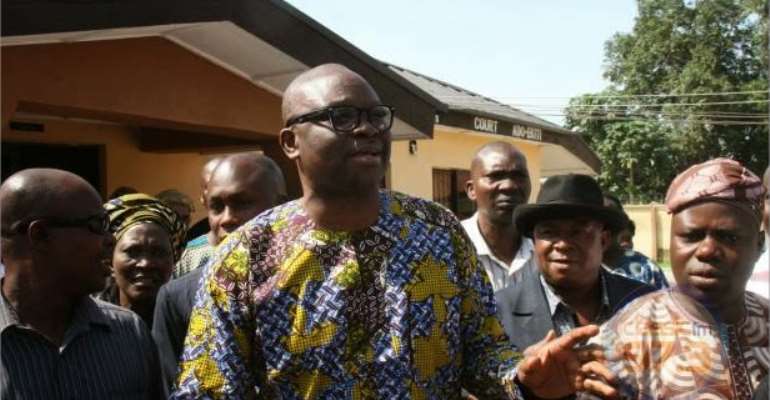Ekiti Guber: Supreme Court Dismisses APC Appeal, Okays Fayose's Election (reworked)

SAN FRANCISCO, April 14, (THEWILL) – Relief came for embattled Ekiti State governor, Ayodele Fayose, Tuesday, as the Supreme Court dismissed the appeal of the All Progressives Congress (APC) against the judgment of the Court of Appeal which dismissed the party's appeal against the judgment of the Ekiti Governorship Election Tribunal which upheld Fayose's election as Ekiti governor.
The apex court in a unanimous judgment by a panel of seven Justices ruled that impeachment was not a ground for disqualification as it cited section 182(1)(e) of the constitution which listed the grounds for disqualification.
According to Justice Sylvester Nwali Ngwuta who delivered the lead judgment, only a court of law or the Code of Conduct Tribunal could find a person guilty before such a person would be disqualified from standing election for ten years.
The Justices of the apex court held that the proper thing to be done after Fayose was impeached was to charge him before the Code of Conduct Tribunal and that having not done that, he was not barred from re-seeking election as governor of Ekiti state.
The Supreme Court also held that since the first panel constituted by the then Chief Judge of the State, cleared Fayose of any wrong doing, the matter ought to have ended there in accordance with the section 188 (8) of the constitution.
According to the apex court, the constitution of another impeachment panel by the Acting Chief Judge of the State, Justice Jide Aladejana, (who was later dismissed by the National Judicial Council) was an illegality.
Also dismissed by the Supreme Court was the allegation that the Higher National Diploma (HND) certificate submitted to the Independent National Electoral Commission (INEC) by Fayose was forged.
In dismissing the appeal, the court held that the allegation being criminal in nature must be proved beyond reasonable ground and that the appellant failed to so prove.
The allegation was also dismissed on the ground the Court of Appeal had held with finality that: The certificate was not forged in the case filed by the defunct Alliance for Democracy (AD) when the party challenged Fayose when he was first elected governor of Ekiti State.
The Justices also took turn to read out their concurrent judgments.
Justice John Afolabi Fabiyi , in his judgement, said the Acting Chief Judge was illegally appointed and that the second panel constituted by him was also an illegality.
“It will be recalled that the then CJN and Chairman NJC wrote to the Acting CJ to inform him that he was illegally appointed. In the letter, the CJN wrote, 'Any action by you will be unconstitutional.'
“Notwithstanding the advice of the CJN, the Acting Ekiti CJ constituted an illegal by panel. An arrant illegality. The impeachment was illegal. Jide Aladejana was dismissed for accepting the illegal appointment as Acting CJ,” Justice Fabiyi said.
Inhis judgement, Justice Bode Rhodes-Vivour, cited Section 188(8) of the 1999 constitution, saying it was very clear: According to him, “Where allegations against the governor were not proved, the matter ended there and no further steps should be taken. To set up a second impeachment panel amounted to an illegality.”
He added: “Assuming the second panel was legally constituted and Fayose was convicted of stealing and impeached.
The proper thing to do was for the authority to arraign him before the Code of Conduct Tribunal. A governor impeached of stealing should have been tried and convicted at the Code of Conduct tribunal. It is after then can he be disqualified from seeking re-election until after ten years.
“Impeachment is not a ground for disqualification. Fayose was impeached and was allowed to go home. He should have been charged, tried and convicted. This is laxity on the part of our institutions. ”
Justice Bata Ogunbiyi, in his judgement, ruled that to use impeachment as ground for dis-qualifying Fayose from seeking re-election would amount to a violation of his fundamental right to fair hearing.
